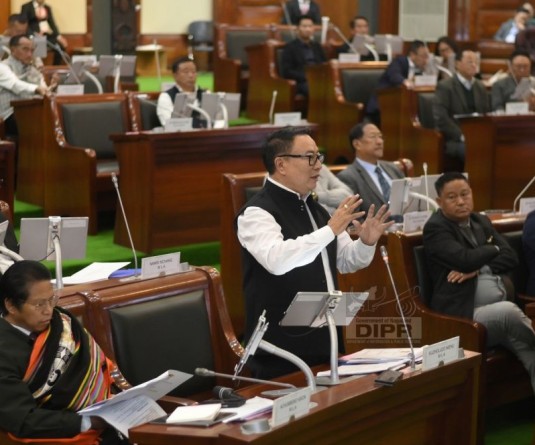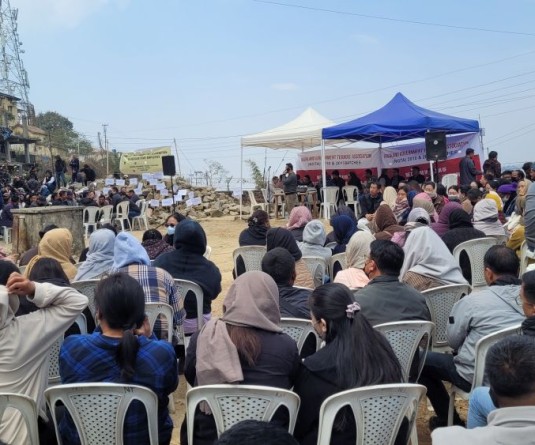
SASRD conduct awareness on PPV & FRA, which ensures protection of intellectual property rights of plant varieties, recognize, and reward farmers for their contributions in preserving and conserving the plant genetic resources and traditional varietal wealth.
Morung Express News
Medziphema | March 29
Most farmers in Nagaland are not aware of their rights established by The Protection of Plant Varieties and Farmers’ Rights Authority (PPV&FRA) under the Ministry of Agriculture and Farmer’s Welfare Department, Government of India through the Protection of Plant Varieties and Farmers’ Rights Act, 2001.
In this context, the School of Agricultural Sciences and Rural Development (SASRD), Nagaland University, Medziphema conducted an awareness programme on “Protection of Plant Varieties and Farmer’s Rights” on Wednesday.
Prof RR Hanchinal, chairperson of PPV & FRA, who was one of the key speakers, gave an overview of Protection of Plant Variety and Farmers Right Act, 2001 (PPV & FR) and the activities carried out by the authority.
The PPV & FR is an Act of the Parliament of India enacted to provide for the establishment of an effective system for protection of plant varieties, the rights of farmers and plant breeders, and to encourage the development and cultivation of new varieties of plants.
He informed that the PPV & FR act has made provisions to establish a National Gene Fund through which the conservation of varieties developed can be done, recognized and rewarded. This fund supports and reward farming /tribal/rural communities who are engaged in conservation, improvement and preservation of genetic resources of economic plants and their wild relatives.
Prof Hanchinal also urged the deserving Nagaland farmers to apply for the various awards constituted under the PPV & FR act like the Plant Genome Savior Community Award etc. He expressed disappointment that Nagaland state lacked enthusiasm to promote its deserving farmers.
The 'Plant Genome Saviour Community Award' is awarded to community of farmers which is engaged in conservation, improvement and preservation of genetic resources of economic plants and their wild relatives, particularly in areas identified as agro-biodiversity hotspots.
He also gave a summary of the Indian seed industry, seed market composition, and the challenges faced by the seed industry.
With very little known to most of the farmers about the registration procedure of their own variety and the financial benefit out of it, Dr Ravi Prakash, Registrar gave a concise explanation on registration of farmer’s varieties.
Farmers’ varieties are defined as varieties that have traditionally been cultivated and developed by the farmers in their fields, or varieties that are a wild relative or land race of any variety about which farmers possess common knowledge.
Dr Prakash explained that plant variety protection provides legal protection of a plant variety to a breeder in the form of Plant Breeder's Rights. Plant Breeder's Rights (PBRs) are intellectual property rights that provide exclusive rights to a breeder of the registered variety.
PPV&FRA have so far received 115 applications of farmer’s varieties from Nagaland, which is still being tested for confirmation.
The Registrar however observed that the figure was very less considering the fact that Nagaland is one of the richest biodiversity hot spot in the country. “We expected at least 5000 or 10,000 of such applications,” he stated adding that many farmers will be benefitted out of this registration.
He also urged Nagaland farmers to come forward to apply for the different awards under the Act.
Prof Sapu Changkija, Department of Genetics & Plant Breeding, Medziphema campus, NU gave a power point presentation “Glimpses of floristic diversity of Nagaland.”
He said Nagaland lies in the 10th district bio-geographic zone under one of the identified 10 mega-spot in the world with reference to threats to biodiversity. Prof Sapu informed that the floral vegetation and fauna elements represent the transitional zone of Indian, Indo-Malayan and Indo-Chinese bio-geographic region. Citing an instance, he said the Patkai range of Nagaland is a bio-geographic gateway.
Earlier, Prof RC Gupta, Dean, SASRD, NU in his brief remark as the chief guest also exhorted the farmers and students in attendance on the benefits of farmer’s rights, particularly in Nagaland context. Prof M Aleminla Ao, Department of Entomology, SASRD NU delivered the welcome address.






